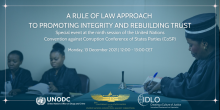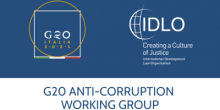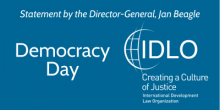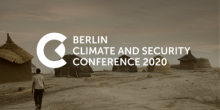Hague Setting for Wide-Ranging Rule of Law Debate
The rule of law is emerging as one of the most pressing issues of this century. It is a cornerstone of peace, security, justice and development.


By transferring resources from public to private hands, corruption negates the benefits of development. Similarly, favoritism and nepotism are the antithesis of fairness and equality. It is no coincidence that the most corrupt polities are also the poorest, most unequal and most justice-deficient. If the rule of law and development are to take hold, good governance is a necessary condition.
For this reason, IDLO has undertaken to expand its portfolio of integrity-focused projects. Promoting good governance is an area so broad as to be almost inexhaustible. In our case, it may mean helping countries make the institutions of justice cleaner and more responsive; reducing conflict of interest in procurement and public life; seeking to ensure adequate funding for the judiciary; or strengthening the capacity to fight fraud and economic crime.
The rule of law is emerging as one of the most pressing issues of this century. It is a cornerstone of peace, security, justice and development.


EVENT | Monday, 13 December 2021 | 12:00 - 13:00 CET
A Rule of Law Approach to Promoting Integrity and Rebuilding Trust
Special event at the ninth session of the United Nations Convention against Corruption Conference of States Parties (CoSP)

IDLO Statement at the 3rd Meeting of the G20 Anti-Corruption Working Group
Rome, Italy
Delivered by Liliana De Marco, Director of External Relations and Partnerships, IDLO
It is a pleasure to take the floor on behalf of the International Development Law Organization (IDLO).

COVID-19 is exposing existing fragilities to democracy, good governance and the rule of law. Citizens’ growing distrust of government has been exacerbated by the pandemic and has also limited swift and effective governance responses.

WEBINAR – MULTI-STAKEHOLDER DIALOGUE | 16 September 2020 | 9:00 – 10:30 EDT
Democracy Day in the Time of the Pandemic: A Sustainable Response to the Global Crisis based on Multilateralism and the Rule of Law

WEBINAR
In fragile contexts, the immediate impacts of climate change on precipitation and temperatures risk to combine with political and social tensions exacerbating destructive competition over scarce natural resources.

In fragile contexts, the immediate impacts of climate change on precipitation and temperatures risk to combine with political and social tensions exacerbating destructive competition over scarce natural resources.
This is tragically evident in Africa’s semi-arid Sahel region, where recurrent droughts, population growth and weak governance are increasing pressure on land and water







|
Publication
|
|
Policy Statements
|